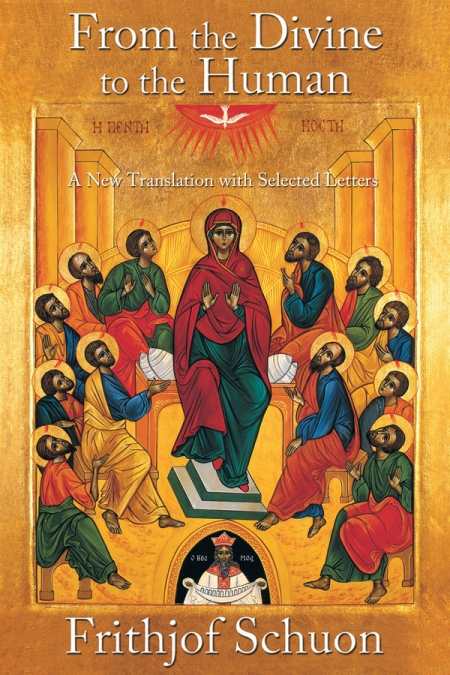From the Divine to the Human
A New Translation with Selected Letters
Schuon’s simplified thesis could be paraphrased as an unequivocal proof offering on every level of debate that there is a loving God.
Reading From the Divine to the Human by Frithjof Schuon, one of the preeminent religious thinkers of the twentieth century, is not an easy task. It is well worth the effort, however, as an intellectually, linguistically, and spiritually challenging endeavor. First published in France in 1981, this edition has been newly translated and includes an appendix with excerpts from Schuon’s correspondence and previously unpublished writings, editor’s notes, and a glossary.
The book sports a beautifully illustrated and professional cover. An informative and necessary editor’s preface by Patrick Laude of Georgetown University and a foreword by the author serve as a primer for those new to Schuon’s distinctive style, which is heavy on dense concepts that often require several readings to grasp, as well as lengthy but well-structured sentences.
From the Divine to the Human is organized into three sections and ten chapters that provide welcome boundaries to Schuon’s provocative and inspirational philosophy. His simplified thesis could be paraphrased as an unequivocal proof offering on every level of debate that there is a loving God who orchestrated, endorses, and transcends all religions. Human intelligence, the profound similarities of all the world’s religions, and the miracle of the human body, to name a few, are all obvious examples of divinity, Schuon asserts with an insistent passion that is compelling, if not convincing.
In the subsection titled “Outline of a Spiritual Anthropology,” Schuon writes, on the subject of intelligence as a proof, “There is nothing more contradictory than a cerebral intelligence opposing itself to cardiac intelligence, whether it be to deny the possibility of knowledge or to deny the ultimate Knower: how can one not feel instinctively, ‘viscerally,’ existentially, that one cannot be intelligent, even very relatively so, without an Intelligence ‘in itself’ that is both transcendent and immanent, and not grasp that subjectivity by itself is an immediate and quasi-fulgurating proof of the Omniscient, a proof almost too blindingly evident to be able to be formulated in words?”
Christians, Jews, Muslims, Buddhists, and Hindus searching for a unifying theme to their teachings will find a compassionate and open-minded ally in Schuon, whose philosophy is that all religions have the same Divine source. Word and language lovers will also find From the Divine to the Human a pleasure to read, with obscure and multisyllabic words appearing several times on every page. Further, the abundance of Latin, Greek, Arabic, and Sanskrit terms make the excellent glossary a priceless reference tool.
Schuon also tackles, with a careful sensitivity to political correctness, religion’s misogynistic tendencies and the bigger issues of how and why a loving God allows evil in all of its manifestations. Additionally, solid refutations of the logic of the atheistic and scientific viewpoints about evolution and the existence of God play a central role in Schuon’s metaphysics.
From the Divine to the Human would be an appropriate addition to bookshelves in a number of genres—from metaphysics to religious thought to spirituality—and would appeal to seasoned religious scholars as well as the curious layperson.
Reviewed by
Patty Sutherland
Disclosure: This article is not an endorsement, but a review. The publisher of this book provided free copies of the book and paid a small fee to have their book reviewed by a professional reviewer. Foreword Reviews and Clarion Reviews make no guarantee that the publisher will receive a positive review. Foreword Magazine, Inc. is disclosing this in accordance with the Federal Trade Commission’s 16 CFR, Part 255.

